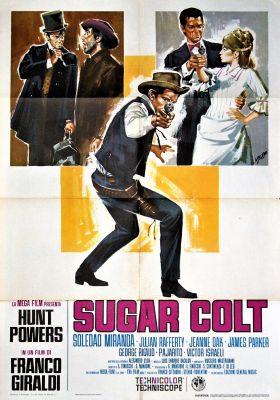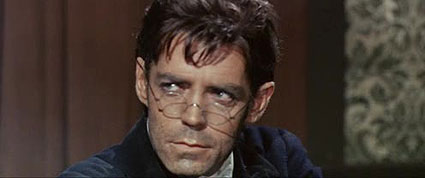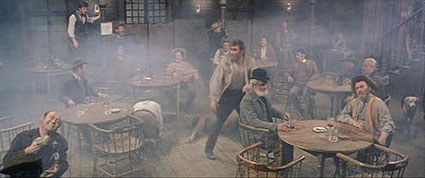Sugar Colt Review by J.D.
Review of Sugar Colt (1966);
I had low expectations for Franco Giraldi's Sugar Colt, becuse I've read several not-so-stellar reviews about it, as well as I have some misgivings about leading man Hunt Powers, as his performances in genre hack Demofilo Fidani's films are typically somewhat unexciting. As it turns out, I was actually quite surprised; although by no means a solid film, I found it somewhat entertaining.
Powers stars as Tom Cooper, aka Sugar Colt, a former federal agent who is now running a shooting school for women (I know, that's a bit zany). His uncle pays him a visit, as they need him back on the job. In the opening scene of the film, we see a Union batallion get ambushed in a ravine, and we don't know what happens to them. They are assumed dead, but Colt's uncle has reason to believe that they were kidnapped and are being held for ransom. He wants Colt to find out the deal and get to the bottom of it. At first he refuses, but eventually goes along with it as his uncle is murdered after the meeting.
Hunt Powers is Sugar Colt
So Colt goes undercover as a rather klutzy doctor, and travels to Snake Valley, where the batallion was headed before it disappeared. It's a rather unwelcoming town that doesn't like outsiders, and he is threatened and harrassed from the moment he gets there. He gets a bit of sympathy from the tavern owner (Gina Rovere) and has eyes for her niece, played by the cute-as-hell Soledad Miranda, who would later shoot to fame as an actress in many of sleazemeister Jess Franco's films.. After nosing around, getting into fights, and even gassing the tavern full of thugs with some strange herbal concoction he throws in the woodstove that sort of acts like a truth serum, he finds out where the soldiers are being held by the town's evil boss, who pretty much runs the place with an iron hand. Colt gets rid of the doctor disguise, kicks some ass as Sugar Colt, frees the soldiers, and gets the girl.
Sugar Colt gets 'em high as a kite. Who said the old west couldn't be fun?
Now the main criticism that seems to be said about this film is that it doesn't seem to know whether it's a serious film or a comedy (see Son of Django's review for more on that angle). There are more than a few parts where the tone of the film shifts from dead-on serious to somewhat lighthearted, but I have to say - a lot of that has to do with the soundtrack. Luis Bacalov's music goes from tense and dramatic (with an excellent piece featured several times with some trumpets and timpanis) to silly, as exemplified in the cornball Dixieland-ish music bits (complete with annoying slide whistle) that are featured in other spots.
If you're a fan of the genre, you're no stranger to the importance of the role of the music in the films - they can really make or break a movie sometimes. What we have here is poor use of the music. There's a scene shortly after Colt comes into town, and gets manhandled when he goes into the tavern and pushed around a bit. He comes back downstairs in something that looks like 19th century men's long underwear, challenges the ruffians in the tavern to a boxing match, and proceeds to beat the living shit out of 'em. While this is going on, the silly Dixieland music is playing in the background, completely giving the scene a slapstick feel, even though there's really no slapstick to be seen. It's really a hard knuckled bar brawl, and with a different score behind it, it would have come across that way, but it didn't. There are several other similar scenarios in the film, where I'd be wondering why the hell they were playing this silly music over a scene that seemed somewhat serious.
And that's not to say there's not some cheesy comedy-like moments (such as the aforementioned shooting school for girls), but aside from the mismatched music, I didn't really feel like I was watching a comedy. I have a rather strong dislike for comedy spaghetti westerns, and that feeling never really seemed to rear its ugly head when watching this. The comedy western as a staple of the genre was still a few years off, too. It was more like a detective story, and I found myself enjoying it for the most part. Powers (who reminds me of American actor William H. Macy) played a likable, somewhat believable character, not at all like his walking cliché as Django in Fidani's One Damned Day at Dawn, Django Meets Sartana, which I thought was a joke. The supporting cast is able, as well.
There's some good cinematography by Alejandro Ulloa; when Colt first comes into Snake Valley, the camera pans down through the street at all of the scowling, unfriendly faces. I thought that it was a rather effective scene.
Is this a great film? Not by any means, and it's probably not something you'd watch more than once, but if you're looking for something not too intense or serious, with a decent storyline, you could give this one a try.
This article is part of the A Fistful of Pasta archive






